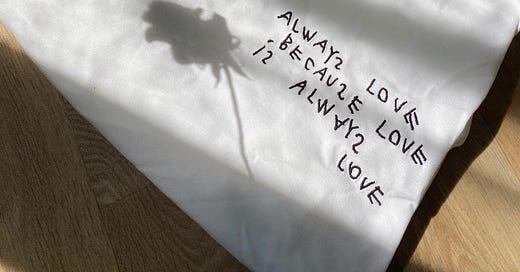On Online Friendship & Digital Reverie in France and the US
A transatlantic exploration of how virtual connections have evolved, from the early days of the internet to today's algorithm-driven world.
is a Chicago-based internet culture reporter and historian. On her Substack, default.blog, she shares an emotional and psychological scrapbook of digital life. Co-authoring an essay on the evolution of online friendship, with both American and French perspectives, was a perfect match.
Online friendship: natural, but degraded?
Laurent François (LF): Online friendship feels natural in 2024, but its nature has dramatically transformed, shaped by a strange combination of technological and societal changes. While we may embrace these changes, it’s crucial to recognize the ways platforms have influenced the way we connect. Cherishing online friendships is important, but we should also consider taking control back from the platforms that increasingly dictate our interactions.
Katherine Dee (KD): The Internet has opened up unprecedented opportunities for deep friendships—this is one of my most steadfast beliefs. In an article for Comment magazine, I explored the idea of getting to know people "soul first" online. However, this comes with a caveat: true virtual friendships require effort in the same way that friendships in the physical world do. Simply interacting with someone's social media posts or participating in the same Discord server or group chat doesn't automatically create a meaningful connection. Since the advent of social media, the word “friend” has been degraded.
Since the advent of social media, the word “friend” has been degraded.
Katherine Dee
I see people refer to their X, TikTok, and Instagram followers as their “friends” all the time. Internet friendship is a beautiful if complicated thing. And it should be treated with the same respect that we treat our “real world” relationships.
The Early Days: A Window to Escape (1990s–Early 2000s)
LF: In France, the internet in the late 90s and early 2000s was a portal to another world—a world of anonymity, passion, and discovery. I still remember the sound of the house’s 56k modem dialing up, as if announcing a small, thrilling adventure. This effort—the time it took to connect—felt like it made the experience more rewarding. Once you finally opened a browser, you could launch an applet for a chatroom or dive into message boards dedicated to your favorite artists. These were special spaces where anonymous users gathered around shared passions, discussing, debating, and forming connections.
Unlike today, online interactions weren't immediate or constant. Private messages and deeper conversations required real effort and patience. Your online friend could disappear at any moment, perhaps when their sister or brother needed the landline, forcing you to wait and feel the friction of this disconnection. In this environment, websites like Caramail became a digital oasis. Yet in 2003, even at its peak, Caramail only had around 40,000 daily users—a number that pales in comparison to the followings of today’s micro-influencers. Yet, it felt prime, it felt beautiful.
In the county where I lived, in 1996 they launched the Autoroutes de l’Information (Information highways), a name that carried a sense of mystique. The Internet was viewed as a road to an entirely new world. Accessing this digital realm wasn't just about ease or speed but about the promise of what it could offer—an unknown place with an uncertain outcome - and we were passengers in bits and data.
KD: In the US, the Internet played two roles: a virtual playground for identity experimentation (like gender swapping) and an extension of real-world connections. Many online communities grew from physical gatherings, and were able to expand with the help of the Internet. The Internet was a tool to maintain contact, organise future meetups, and expand reach— replacing snail mail and fanzines. Even subcultures often thought of as Terminally Online, like furries and otherkin, followed this pattern. The American anime fandom grew similarly.
Fast forward to today, and the landscape has shifted. The mainstream Internet feels more like an alternate reality where we present carefully curated versions of ourselves on the stage of social media. We're still ourselves, but a polished, performative version of ourselves. While exceptions exist, for most people, the Internet's role as a creative sandbox has taken a backseat.
The average user's online experience has become less about exploration and more about presentation.
Identity in the Early 2000s: A Digital Soul?
LF: Back then, your online profile was more like a reflection of your inner self, your soul, than your real-world identity. Your username was a part of you, but often a part that few people in your day-to-day life would know. This digital self could be an idealized version of you, an avatar representing your fantasies or alternate realities. Platforms like MySpace allowed you to "skin" your profile, to customize and express who you were (or wanted to be) in ways that felt personal and artistic.
For many, especially those living in more rural areas in France, the people you met online stayed online. These relationships were precious because they required effort to maintain.
These relationships were precious because they required effort to maintain.
Laurent François
You had to nurture them over time, and they weren’t based on physical appearances or real-world connections. Conversations could move quickly to deep, heart-to-heart exchanges, bypassing the social barriers often present in face-to-face relationships. Of course, a couple of these conversations could go further. MSN Messenger became the place of another kind of love story. But the journey was still a curated one: adding someone required a personal email address; it would take time to share it. And even the online nightbirds would have less than 100 people on their MSN Messenger. Because it was the way it was.
KD: Something that stands out to me about this period is that while many people, myself included, formed lasting friendships online (I'm still connected with folks I met digitally back in 2003), deception was also much easier. Can friendships built on lies still be considered genuine friendships? They clearly serve some purpose, though I'm not entirely sure what that is.
The concept of "catfishing" isn't new to the online world, but platforms like MSN Messenger and AIM provided fertile ground for such deceptions to thrive. Unlike today, where online friendships can quickly transition to FaceTime calls, webcams were a rarity back then. Even sharing a simple photo of yourself wasn't always possible, not everyone owned a digital camera or a scanner. And the stigma surrounding online relationships often made phone calls, another potential verification method, seem off-limits. This created a perfect storm of plausible deniability for those inclined to misrepresent themselves.
But that said, the nature of who was online and who was using these platforms did make friendships special when they happened. As more people got access to webcams, digital cameras, and finally social media, it was exciting to see your online friends in a new light. To add them on Facebook or MySpace. To hear their voice when they downloaded Skype, or text them when they got a mobile phone. A more personal Internet could feel like taking the mask off in the best way—finally!—a true substitute for meeting friends in person whom you may have known for years.
The Algorithmic Shift: Online Friendships Hacked?
LF: Fast forward to 2024, and we find ourselves in an era where algorithms play a significant role in shaping our online relationships. Extimacy—the act of sharing deeply personal stories with vast, often impersonal audiences—has become a norm on platforms like Instagram and TikTok. Through this extimacy, online friendships can form around highly emotional, sometimes extreme, shared experiences. We are moved to act for strangers, to support causes for people we've never met, and to connect with those whose lives are far removed from our own.
But there’s a catch: this kind of connection often depends on broadcasting a narrative that’s strong enough to catch the algorithm’s attention. The platforms have redefined friendship by encouraging us to perform our lives, broadcasting preformatted stories that are more likely to "go viral." As platforms use AI-driven algorithms to curate content and introduce potential friends based on shared behaviors (not just interests), friendships become easier to discover but sometimes more transactional. These algorithms push us toward connections based on patterns that benefit the platform, not necessarily the depth of the relationship.
Even creative tools like CapCut, which democratize the ability to craft impactful messages, contribute to this phenomenon. These tools allow for the easy editing and presentation of content but also standardize the format in which we connect. The discoverability of new friends is increasingly shaped by the same templates and trends, which risks turning genuine friendship into something prepackaged, more like a product than a personal connection.
KD: In 1994, Internet culture writer Carmen Hermosillo, better known as humdog, sounded an early alarm about the commodification of online sharing in her now famous essay pandora’s vox. Later, she warned about "Board Hos," individuals who craved attention on message boards. This prescient observation highlighted an emerging attention economy, even in the early days of the Internet. However, what Hermosillo couldn't have foreseen was that the online world was still relatively small and populated by genuinely eccentric individuals. People who, while prone to attention-seeking and power hungry behavior, were online for more reasons than just “pay attention to me.”
Back then, the concept of "influencers" didn't exist, which meant people weren't systematically exploiting their personal lives for content like they are today. If we try to pinpoint when things took a turn for the worse, it wasn't with proto-Internet celebrities like Jennifer Ringley, who livestreamed her daily life.
The real shift came with the rise of the confessional essay genre in the 2010s. Suddenly, writing about personal trauma could catapult someone into minor celebrity status. This era marked the birth of capital-I influencers and a significant change in journalism. Writers were now expected to be Internet Personalities first and journalists second. But this shift had a profound impact on online friendships too.
The real shift came with the rise of the confessional essay genre in the 2010s. Suddenly, writing about personal trauma could catapult someone into minor celebrity status. This era marked the birth of capital-I influencers and a significant change in journalism.
Katherine Dee
The focus moved away from finding like-minded communities and towards individual fame-seeking. With everyone trying to monetize their online presence, the pursuit of genuine connections took a backseat to the chase for celebrity status. The problem with this new paradigm is that both attention and money are finite resources. As more people competed for these limited assets, the online environment grew increasingly hostile. The race for views, likes, and sponsorships created a cutthroat atmosphere where empathy and authentic interaction often fell by the wayside.
What we choose to share is dictated by the algorithm—not our genuine interests. And certainly not by the type of people we hope to meet and befriend.
Taking Back Control of Online Friendships
LF: In 2024, online friendship is still an extraordinary force for good, allowing people across the globe to connect in ways that were unimaginable just two decades ago. However, as platforms increasingly shape the narratives and mechanisms through which we build relationships, it’s important to reflect on how these dynamics affect the quality and authenticity of our connections.
KD: So what do we do? My suggestion is to use the Internet as a supplement to the physical world. Plan events. Talk to people with the intention of meeting them. Host events. Bring back the Listserv. Colonize Nextdoor. Use Facebook events. Really, it’s the only way.
Thank you Katherine for your views. You can subscribe to her Substack - Default Blog - and follow
.






I miss the MSN Messenger era!
I met my husband on Jswipe. He lived in Paris and I lived in New York.
After a lot of FaceTime and a few visits, he asked me to marry him and now I live in Paris .